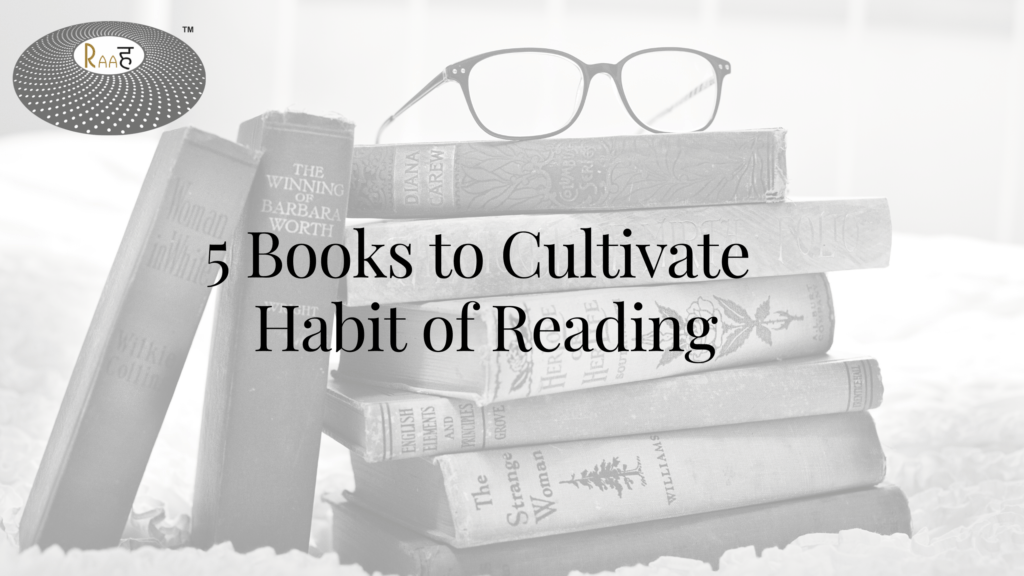Before you start to read this article or blog about habit of Reading and a couple of paragraphs in, decide that this is one of those pieces of writing that laments the bygone days of reading and the golden age of literature, let us save you some time and energy. It is. You might dismiss this easily as a sign of changing times, the habit of people moving away from books and turning to the internet and their smartphones, trading in knowledge of generations for short lived bursts of feel-good dopamine releases. But we do not fully realize the potential impact of reading on our lives and our well-being. We also fail to appreciate the importance of reading and literature in the evolution of humans.
Reading and by extension; literature, are an essential and inseparable part of the human condition. Let me elucidate certain tangible, measurable and researched benefits of reading on the human physiology and psyche.
- Expands Horizons
First and foremost, literature opens our eyes and helps us see more than the mere obvious. It helps our perception about the world outside and surrounding us. With this, we begin to learn, ask questions, and build our intuitions and instincts. We expand our minds.
- Encourages Critical Thought
Any literature student will swear by the numerous lessons on critical theory that they’ve studied in their graduation. Reading is to a normal person what critical theory classes are to literature grads. When we read, we learn to look between the lines. The mind starts to identify patterns, find symbolic relations, make connections, find themes, etc.
- Blast from the Past
History and literature are inextricably entwined with each other. History is not just about power struggles, wars, names, and dates. It is about people who are products of their time, with their own lives. Without literature we would have no context for how history played out and bought us here, to this day. Without literature, we would not know about our past, our mistakes and what we learnt from them and the people who came before and walked on the same ground as us.
- Developing a World View
Reading about history, anthropology, or religious studies provides a method of learning about cultures and beliefs other than our own. It allows you to understand and experience these other systems of living and other worlds. We get a view of the inside looking out, a personal view and insight into the minds and reasoning of others. This broadened world view helps build a sense of empathy and camaraderie between us and the people around us.
- Improve upon Communication Skills
As far as a literary enterprise goes, reading is perhaps the only way to improve one’s writing and spoken communication. Reading is to articulation and writing, what walking is to running. It is a prerequisite to having a good vocabulary, developing a deeper understanding of how languages work and ultimately exploring the human psyche because language is nothing but thought in words.
- Humanity
All literature, whether they are poems, essays, novels, or short stories, help us address the human condition. Literature helps us process our thoughts, our fears, our anxieties, our happiness and elation and it addresses our disappointments. It describes our successes and failures, it instils a sense of companionship when we don’t have anyone, it brings a grander realization about our existence to us. We need literature in order to connect with our own humanity.
- Physiological and Psychological Impact
What we’ve seen unto this point are the benefits accrued by reading in a literary and worldly sense. Let us explore briefly the rewards of reading and literature on the human physiology and psyche. Reading reduces stress levels drastically. Even half an hour of reading increases life expectancy in humans by a couple of years. It preserves and even enhances cognitive brain functions and lowers the risk of Alzheimer’s and dementia. It alleviates anxiety and depression and even helps you fall asleep effortlessly.
Everyone has a reading lane. Whether its romance novels like The Notebook, Fault in our Stars or sci-fi books about time travel, readers often have a channel they return to over and over again. But what about people like you and me who are just getting into the habit of reading and want an introduction to literary writing. Sometimes we think that maybe we ought to read a classic—one of those novels that we skimmed through most unenthusiastically in school, gleaning enough to write a report or a summary.
Check out our Book Library
There are a lot of classic novels out there, so it’s OK if you don’t know where to start. Fret not; we at Raah, a cultural centre in Pune, have compiled this list of five classics that are not only great books, but they also laid the groundwork for current bestsellers and remain some of the most celebrated, timeless works of literature ever produced.
- ‘MOBY DICK’ BY HERMAN MELVILLE – 1851
Moby-Dick has a reputation. The novel wasn’t received well upon publication and the negative sentiment is echoed every year when groaning students are forced to read it. And, yes, there is a lot of talk about 19th-century whaling that leaves even the most thoughtful reader sometimes wondering when, exactly, Melville plans to get to the fireworks and make something happen. He also utilizes an immense vocabulary of over 17,000 unique words in the book, some of which are specialized whaling lingo. Moby-Dick is one of the densest novels ever written.
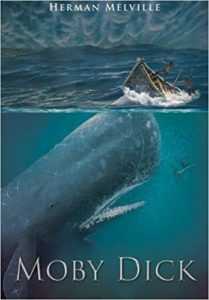
Why You Must Read It:
Despite these surface difficulties, you should make Moby-Dick one of the classics you read for several reasons:
- Pop Culture
Many terms from the book have gained cult status and are used as in common parlance like ‘white whale’ has become synonymous for a foolhardy and dangerous obsession. The name ‘Captain Ahab’ is used as cultural shorthand for an obsession-crazed authoritative figure. In other words, our daily conversation often references the novel whether we realize it or not, and that tells you something about the impact of the book and its characters.
- Thematic
This isn’t just a long book about a guy hunting a whale. It explores complex and elusive themes about existence, morality, and the nature of reality. From a very famous opening line of “Call me Ishmael” to the desolate ending, this novel will change your world view.
- ‘PRIDE AND PREJUDICE’ BY JANE AUSTEN – 1813
‘Pride and Prejudice’ is a literary giant; it’s the inspiration and forms a basis for so many modern novels we’re all familiar with, their plot style, etc. For a book written in the early 19th century, it is surprisingly beyond its time. It fits very well in a modern setting as well and that timelessness is a great asset to its relevance.
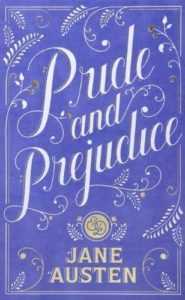
Jane Austen was such a natural writer that you don’t see any of the techniques and innovations she used—you just get a great story about marriage, social class, manners, and personal growth and evolution. It is such a well-constructed story line that it has been literally reproduced by modern authors. Chances are if you’ve enjoyed a book about two people who start out by hating each other and then discover love along the way, you should most probably thank Jane Austen.
Why You Must Read It:
If you’re still unconvinced, there are two other reasons we urge you to read “Pride and Prejudice:”
- Language
This is one of the most sharply written novels ever composed; you can enjoy the novel solely for its language and wit, beginning with its epic opening line: “It is a truth universally acknowledged that a single man in possession of a good fortune must be in want of a wife.”
- The Plot
If one makes some minor tweaks to the language and time setting, ‘Pride and Prejudice’ and its story still plays in the modern world. In other words, things haven’t changed much when it comes to marriage, relationships, or status since Austen’s day.
- ‘ULYSSES’ BY JAMES JOYCE
Picking up a book like Ulysses is considered a formidable task because its reputation precedes it everywhere; its reputation of being a postmodern literary behemoth; a book that tests the resolve of even the most seasoned and voracious reader. And to be fair it is one of the most prolific and complex novels ever written. Chances are if you know nothing else about the book, you should know that “Ulysses” uses the ‘stream of consciousness’ method. Stream of consciousness wasn’t even a term when the book came out. Something that closely resembles this style of writing is Tolstoy’s writing in “Anna Karenina. It is also a sprawling novel dense with allusions, wordplay, obscure jokes, and intensely, opaquely personal ruminations by the characters.
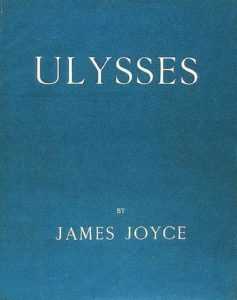
The thing to bear in mind when taking on a herculean task is to not think of it as that. When you enjoy the book as just a slightly more voluminous novel, just like any other and for its language and style, you’ll find it much easier to go through it.
Why You Must Read It:
Enjoy it for the hilarious, rambling epic it is. If that’s not enough, here are two more reasons:
- The Humour
Joyce had a wicked sense of humour and a big brain, and the ultimate joke of ‘Ulysses’ is that he borrowed the structure of Homer’s epic poetry to tell a series of jokes. Sure, the jokes are phrased in a riddling literary style and you will need the internet to look up references, but the key is that this novel doesn’t take itself too seriously, and neither should you.
- The Complexity and Intricacy
Don’t worry if you read it and don’t understand a word of it the first time. If someone tells you they understand everything in this book, they are lying to you. When you pick up Ulysses, you’re joining a worldwide club of people who have chosen to do something difficult but ultimately rewarding.
- ‘TO KILL A MOCKINGBIRD’ BY HARPER LEE
‘To One Kill a Mockingbird’ is one of the most deceptively simple novels ever written. It is often dismissed as a charming look at a young girl named Scout’s first brush with adult concerns in 1930s small-town Alabama. The adult concerns, however are horrifying racism and entrenched meanness among the white citizens of the town. The story centres on a black man accused of raping a white woman; with a character named Atticus Finch, father of the child, taking on the legal defence.
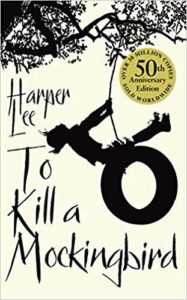
Sadly, the issues of racism and an unfair legal system are as applicable today as they were in 1960, and that alone makes “To Kill a Mockingbird” socio-politically relevant still and a must-read. Harper Lee’s has a fluid, clear prose way of writing and thus manages to be thoroughly entertaining. But the entertainment is supplemented with subtle examinations of the attitudes and beliefs of people which permit prejudice and injustice to persist even to this day. Lee’s book therefore also turns into a commentary about the deplorable condition in many places to this date when it comes to racism and bigotry.
Why You Must Read It:
Sure, a book published in 1960 and set in the 1930s might not sound so compelling—but here are two things to consider:
- Relevance
One can put oneself in the shoes of Scout Finch. In the novel, an integral part of Scout’s life whilst growing up is the realisation that the people around her —people she thought were good and righteous—are deeply and disappointingly flawed. For a lot of us it is the same feeling that pervades of conscience when we turn to social media or the news to see what’s happening around us.
- Cultural Marker
The book is entrenched and referenced to, albeit subtly, in a lot of cultural narratives, especially in the American context. Once you read it, you’ll start seeing it everywhere regardless of whence you hail from.
- SPECIAL MENTIONS
There are a bunch of other books that deserve a special mention owing to their popularity and vast readership which has made them staples. They are more modern and from varying genres such as fiction and sci-fi which also command a vast readership. They are more accessible and easy reads and can most certainly get you hooked to reading. They are actually staples in the reading list of most people who start out.
J.K. Rowling – Harry Potter Series
J.R.R. Tolkien – Lord of the Rings series, The Hobbit series
Paulo Coelho – The Alchemist, Veronika Decides to Die, the Devil and Mrs.Prym
Jeffrey Archer – Kane and Abel, Not a Penny More Not a Penny Less, False Impressions, A Prisoner of Birth are all highly rated books.
Sidney Sheldon – The Other Side of Midnight, Doomsday Conspiracy
Dan Brown – The Da Vinci Code, Inferno, Angels and Demons, Digital Fortress
Alistair Maclean – The Guns of Navarone, Where Eagles Dare, Puppet on a Chain, the River of Death
Isaac Asimov – I Robot, the Bicentennial Man, the Foundation Series

